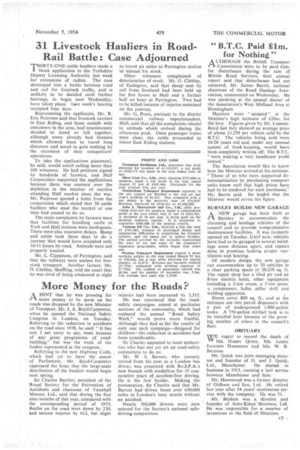31 Livestock Hauliers in Road Rail Battle: Case Adjourned
Page 45

If you've noticed an error in this article please click here to report it so we can fix it.
THIRTY-ONE cattle hauliers made a block application to the Yorkshire Deputy Licensing Authority last week for extensions of radius. The case developed into a battle between road and rail for livestock traffic, and is unlikely to be decided until further hearings, to begin next Wednesday, have taken place. Last week's hearing occupied four days.
Representing the applicants, Mr. R. Eric Paterson said that livestock carriers in East Riding, and those outside with customers in the area, had unanimously decided to stand or fall together, although some already had licences which allowed them to travel long distances and stood to gain nothing by the extension of their competitors' operations.
To take the applications piecemeal, he said, would entail calling more than 100 witnesses. He had petitions signed by hundreds of farmers, and Hull Corporation supported the applications because there was concern over the depletion in the number of carriers attending Hull market since the war. Mr. Paterson quoted a letter from the corporation which stated that 30 cattle hauliers who used the market at one time had ceased to do so.
The main complaints by farmers were that facilities for handling cattle at York and Hull stations were inadequate. There were also excessive delays. Sheep and cattle took three days to do a journey that would have occupied only 10-11 hours by road. Animals were not properly treated.
Mr. L. Clappison, of Patrington, said that the railways were useless for livestock transport. Another farmer, Mr. D. Clubley, Skeffling, told the court that he was tired of being awakened at night to travel six miles to Patrington station to unload his stock.
Other witnesses complained of deterioration of stock. Mr. G. Clubley, of Easington, said that sheep sent by rail from Scotland had been held up for five hours at Hull and a further half an hour at Patrington. Two had to be killed because of injuries sustained on the journey.
Mr. G. Peers, assistant to the district commercial railway superintendent, Hull, said that all the complaints related to animals which arrived during the afternoon peak. Once passenger trains were clear, the cattle proceeded to minor East Riding stations.




















































































































